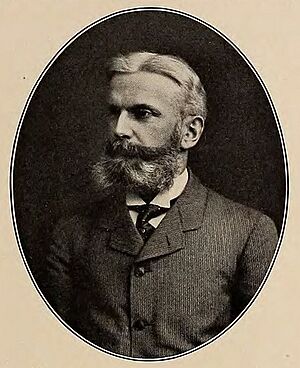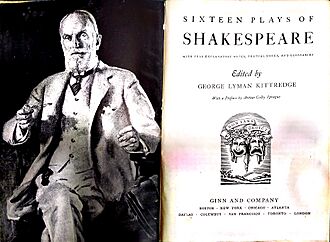George Lyman Kittredge facts for kids
Quick facts for kids
George Lyman Kittredge
|
|
|---|---|

A 1906 portrait of Kittredge
|
|
| Born | February 28, 1860 Boston, Massachusetts, U.S.
|
| Died | July 23, 1941 (aged 81) |
| Alma mater | Harvard University |
| Occupation | English professor, folklorist |
| Spouse(s) | Frances Eveline Gordon |
George Lyman Kittredge (February 28, 1860 – July 23, 1941) was a famous professor of English literature at Harvard University. He was known for his important work on William Shakespeare's plays in the early 1900s. He also studied American folklore, which includes old stories, songs, and traditions. Kittredge helped create and manage the Harvard University Press, which publishes books. One of his well-known books was about witchcraft in England and New England.
Contents
Early Life and School Days
George Kittredge was born in Boston, Massachusetts, on February 28, 1860. His father, Edward Kittredge, had an adventurous life. He was part of the California Gold Rush in 1849, survived a shipwreck, and walked 700 miles across a desert. After these adventures, he returned to Boston, married Deborah Lewis Benson, and started a family.
George was a very smart and studious child. He went to The Roxbury Latin School, which had about 100 students. George always got the best grades in his class. He won a scholarship to Harvard, which he started in 1878.
As a freshman, George lived at home in Boston to save money. He walked to Harvard every day. He earned top honors and joined several clubs. He also wrote poems and won awards for his essays and translations. He even translated something from English into ancient Greek! He became an editor for the Harvard Advocate, the college's literary magazine.
In 1881, Kittredge helped with a famous student play. It was Oedipus Rex by Sophocles, performed in original Greek. Many famous people watched it, including Ralph Waldo Emerson and Henry Wadsworth Longfellow. In 1882, George was chosen to give a funny speech to his graduating class.
Teaching Career
George Kittredge couldn't go straight to graduate school because he didn't have enough money. So, from 1883 to 1887, he taught Latin at Phillips Exeter Academy. He was about six feet tall and thin. His students were impressed by his high standards, sense of humor, and how well he could speak Latin.
Teaching at Harvard University
Kittredge joined Harvard as an instructor in 1888. He quickly moved up and became a professor in 1896. He took over from Professor Francis James Child in the Modern Languages department. This department included languages other than Latin or Greek.
Kittredge and Child had both taught Harvard's English 2 course on William Shakespeare. After Child died in 1896, Kittredge took over the class completely. Child had not finished his big project on old English and Scottish songs. So, Kittredge helped publish the five-volume collection. Later, Kittredge helped expand the study of old songs and stories to include American folklore. In 1904, he became president of the American Folklore Society.
English 2, his Shakespeare class, was very popular. About 275 Harvard students took it. Kittredge also taught other courses, including a survey of Geoffrey Chaucer, grammar, and Anglo-Saxon. In the German department, he taught Icelandic and German mythology. His graduate courses included medieval romances like Sir Gawain and the Green Knight.
Many famous people were Kittredge's students. These included Franklin Delano Roosevelt, who later became president. Other students included folklorists like John A. Lomax, who collected cowboy songs. Kittredge was one of Harvard's most popular teachers. His students lovingly called him "Kitty." He became the Gurney Professor of English at Harvard in 1917. He stopped teaching in 1936 but kept working on his Shakespeare edition until he died in 1941.
Teaching at Radcliffe College
Women were not allowed to attend Harvard University directly during Kittredge's time. However, Kittredge traveled to Radcliffe College to teach a Shakespeare course for women. It was very similar to his popular Harvard class.
Scholarly Work
Kittredge's version of Shakespeare's plays was the standard for many years. People still mention it today. He was also a leading expert on Geoffrey Chaucer, a famous medieval poet. Kittredge helped make Chaucer a key part of college English studies. His essay "Chaucer's Discussion of Marriage" (1912) introduced the idea of a "marriage group" in The Canterbury Tales.
Through his research, Kittredge also identified Thomas Malory. Malory wrote Le Morte d'Arthur (1485), a famous book about King Arthur. Before Kittredge, Malory was a mystery. Kittredge found out he was a knight and a member of Parliament. This discovery opened the door for more research into Malory's life. Kittredge's work on Sir Gawain and the Green Knight was also very important.
Kittredge collected folk tales and songs. He wrote a lot about the folklore of New England and the witch trials there. He also wrote and co-wrote textbooks for Latin and English grammar. He helped edit popular English books for the public. At Harvard, he helped edit eleven volumes of Harvard Studies and Notes in Philology and Literature. He was also a founder and supervisor of the Harvard University Press.
His popular book, Words and their Ways in English Speech (1901), written with J. B. Greenough, was a big success. It was a great resource for teachers. Kittredge also helped revise the English used in a translation of the Psalms for the Jewish Publication Society in 1903.
There's a famous story about Kittredge not having a Ph.D. When asked why, he supposedly joked, "But who would examine me?" However, a friend said Kittredge denied ever saying this. In 1932, Oxford University gave him an honorary degree during a lecture tour in England.
His Impact on Studying Literature
Kittredge and his mentor, Child, belonged to a school of thought called philology. This approach studied language and literature by looking at their history and culture. In the 1880s, when English literature became a university subject, scholars wanted it to be seen as serious. Philology helped because it focused on facts and scientific methods.
Students in Kittredge's classes learned about how English changed over time. They studied how languages like Danish, French, and Latin influenced English. But they also connected these language changes to the wider cultural history. The goal was to become a very knowledgeable scholar.
Kittredge's undergraduate Shakespeare students had to read plays very slowly. They almost memorized the texts. Kittredge would say, "The purpose of this course is to find out what Shakespeare said and what he meant when he said it." He was very strict in class. Being late, wearing hats, yawning, or coughing were not allowed. One student was even kicked out for coughing!
However, his approach with graduate students was different. He was very friendly and invited them to his home for weekly gatherings. There, students would read papers that often became their dissertations.
As head of Harvard's Modern Languages Division, Kittredge set the requirements for graduate degrees. He insisted that students studying literature learn several foreign languages, just as he had. He believed that modern languages should not replace the study of Greek and Latin.
Some people, like his colleague Irving Babbitt, criticized Kittredge. They felt he focused too much on small details and took the life out of literature. These critics believed literature should teach moral lessons. But Kittredge and his students studied literature in its historical context. They wanted to understand "the spirit of an age." Kittredge believed reading Chaucer helped students understand the Middle Ages, which had similarities to their own time. He also encouraged students to explore new fields like Finnish and Celtic studies.
One former student, Elizabeth Jackson, said Kittredge taught Shakespeare with great excitement. She felt he taught as if "every single human being could go on reading Shakespeare through time and eternity."
Over time, new ways of studying literature appeared. However, Kittredge's influence remained strong. The strict language requirements for a Harvard English degree stayed until he retired in 1936. After that, these requirements were dropped. Later, a new approach called New Criticism became popular. It focused on studying the text itself, without much historical context. This led to the term "philology" becoming less popular. But some scholars today are trying to bring back an understanding of Kittredge's important place in the history of English literature studies.
Personal Life
In 1886, Kittredge married Frances Eveline Gordon. Her father was a lawyer and a kind person who had been president of the New Hampshire Senate. The couple went to Europe for their honeymoon and stayed for a year in Germany. At that time, Germany was a major center for graduate studies. Kittredge had already studied German. He attended courses in Old Icelandic and other subjects at the universities of Leipzig and Tübingen. In 1887, he published an article in a German magazine about Beowulf. George and Frances had three children: Francis Gordon (born 1887), Henry Crocker (born 1890), and Dora (born 1893).
Major Works
- Observations on the Language of Chaucer's Troilus, 1894.
- Professor Child, 1897.
- Chaucer and Some of his Friends, 1903.
- Arthur and Gorlagon, 1903.
- The Mother Tongue, 1902, with Sarah Louise Arnold.
- Notes on Witchcraft, 1907.
- Chaucer's Discussion of Marriage, 1912.
- An Advanced English Grammar, with Exercises, 1913.
- Chaucer and his Poetry, 1915.
- A Study of Gawain and the Green Knight, 1916.
- The Old Farmer and His Almanack, 1920.
- Witchcraft in Old and New England, 1929.
- The Complete Works of Shakespeare, 1936.
- The Old Teutonic Idea of the Future Life (the Ingersoll Lecture, 1937)
Legacy and Honors
Kittredge received many honors for his work:
- He was elected to the American Academy of Arts and Sciences in 1898.
- He became a member of the American Antiquarian Society in 1901.
- In 1905, he was elected to the American Philosophical Society.
 | William Lucy |
 | Charles Hayes |
 | Cleveland Robinson |


